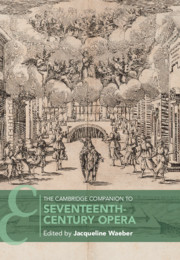Book contents
- The Cambridge Companion to Seventeenth-Century Opera
- Cambridge Companions to Music
- The Cambridge Companion to Seventeenth-Century Opera
- Copyright page
- Contents
- Music Examples
- Figures
- Tables
- Contributors
- Preface
- Chronology
- Abbreviations
- Part I The Italian Foundations
- 1 Opera Is Born
- 2 ‘…e poi le parole’
- 3 Aria, Recitative, and Chorus in Italian Opera
- 4 Opera as Spectacle, Opera as Drama
- Part II Society, Institutions, and Production
- Part III National Traditions (outside Italy)
- Further Reading
- Index
4 - Opera as Spectacle, Opera as Drama
from Part I - The Italian Foundations
Published online by Cambridge University Press: 08 December 2022
- The Cambridge Companion to Seventeenth-Century Opera
- Cambridge Companions to Music
- The Cambridge Companion to Seventeenth-Century Opera
- Copyright page
- Contents
- Music Examples
- Figures
- Tables
- Contributors
- Preface
- Chronology
- Abbreviations
- Part I The Italian Foundations
- 1 Opera Is Born
- 2 ‘…e poi le parole’
- 3 Aria, Recitative, and Chorus in Italian Opera
- 4 Opera as Spectacle, Opera as Drama
- Part II Society, Institutions, and Production
- Part III National Traditions (outside Italy)
- Further Reading
- Index
Summary
The ‘old regimes’ in Europe marked happy occasions such as births, birthdays, and weddings as conspicuously as they could, often in a series of sumptuous events. For the general public, there might be street processions, races, jousts, and religious rites made special by richly decorated liturgical spaces and extraordinary music. The nobility, however, expected private festivities suited to their place in society. They held banquets and balls for each other and often prepared staged entertainments. Across Europe, the nature of such private amusements varied from palace to palace and court to court; but it is as one of the varieties of occasional celebrations at court that opera began, borrowing and transforming different features from them. It shared with them song, dance, instrumental music, and poetic texts delivered by costumed figures. A set of songs and dances could be held together loosely by a theme. Recited poems and solo songs could pepper a pantomimic ballet; musical intermedi could lighten a spoken play. Any representation could focus on astonishing stage machines – flying dragons and chariots for gods and goddesses, sudden transformations of scenery, or the spouting of fountains. Poetic recitations or musical tableaux could justify or merely adorn these technical wonders. Although opera took on features of court spectacle, it never displaced the other forms. Not only were its special requirements onerous – a stable of singers with the time and ability to memorise and deliver extended roles – but it also demanded acceptance as poetic drama.
- Type
- Chapter
- Information
- The Cambridge Companion to Seventeenth-Century Opera , pp. 77 - 102Publisher: Cambridge University PressPrint publication year: 2022



